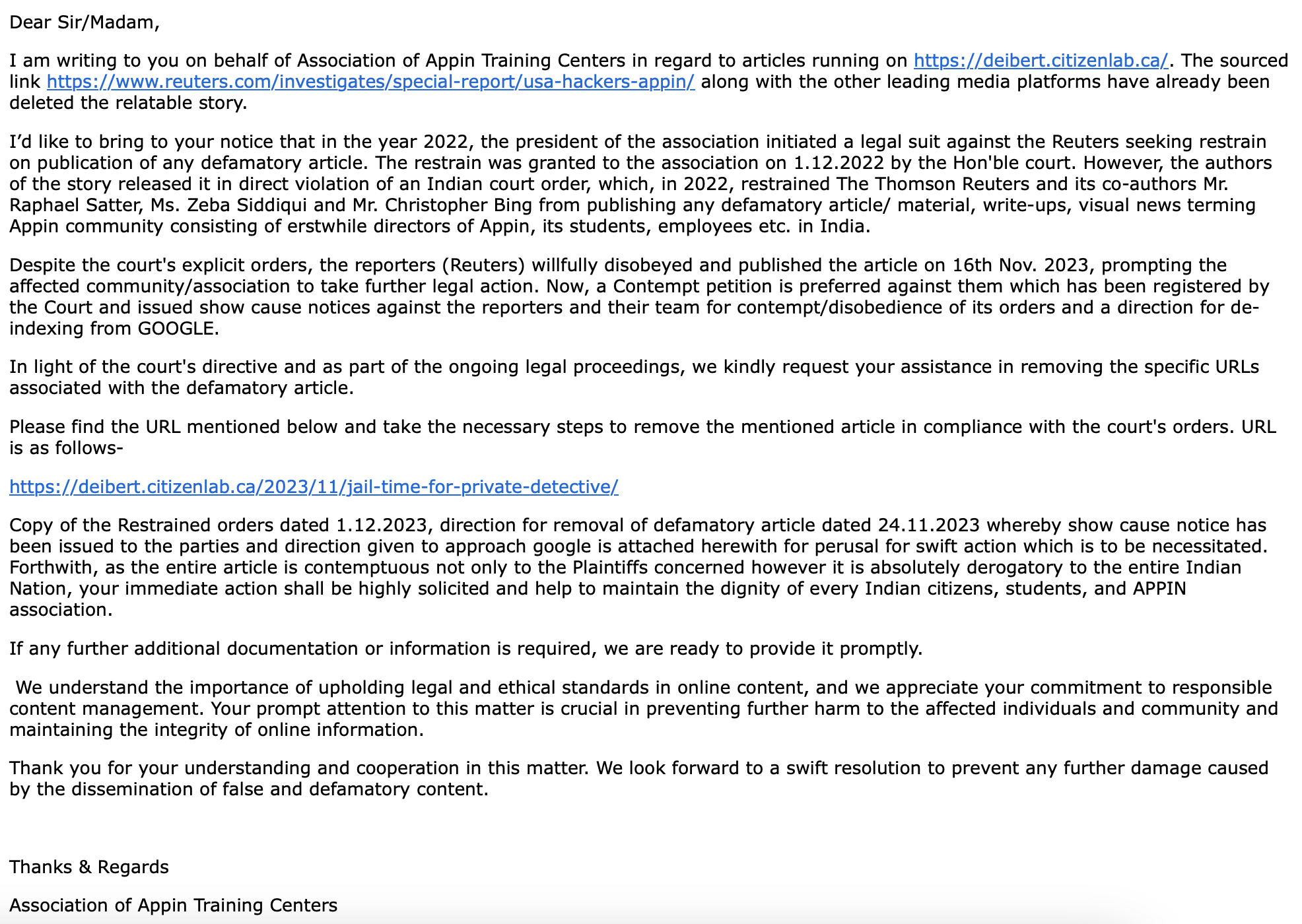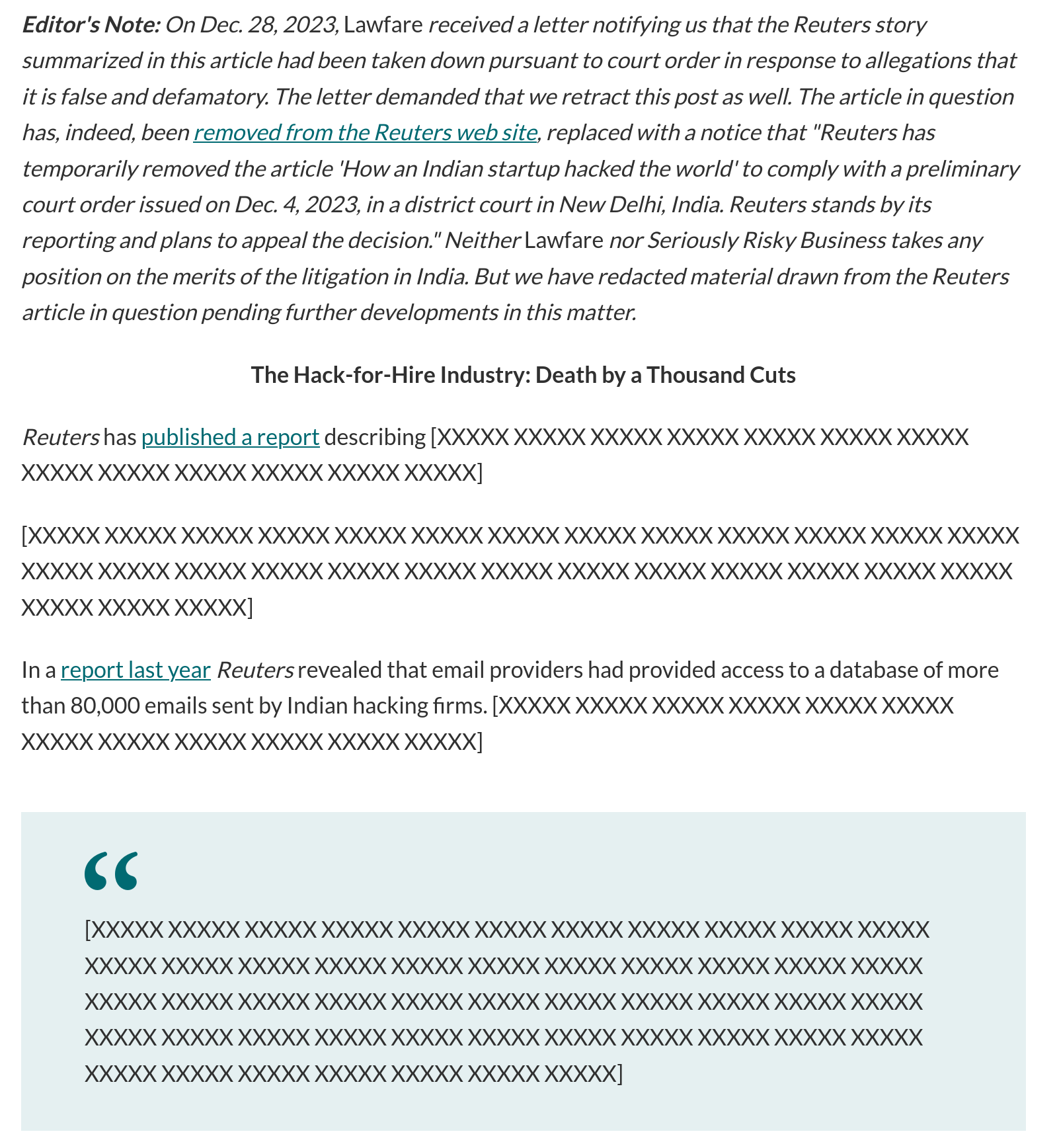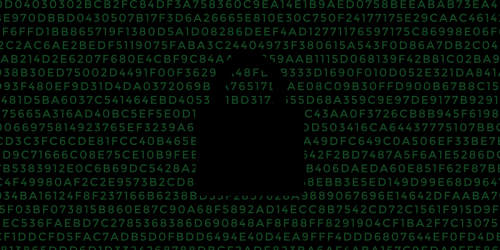Cyber mercenaries present a grave threat to human rights and freedom of expression. They have been implicated in surveillance, torture, and even murder of human rights defenders, political candidates, and journalists. One of the most effective ways that the human rights community pushes back against the threat of targeted surveillance and cyber mercenaries is to investigate and expose these companies and their owners and customers.
But for the last several months, there has emerged a campaign of bullying and censorship seeking to wipe out stories about the mercenary hacking campaigns of a less well-known company, Appin Technology, in general, and the company’s cofounder, Rajat Khare, in particular. These efforts follow a familiar pattern: obtain a court order in a friendly international jurisdiction and then misrepresent the force and substance of that order to bully publishers around the world to remove their stories.
We are helping to push back on that effort, which seeks to transform a very limited and preliminary Indian court ruling into a global takedown order. We are representing Techdirt and MuckRock Foundation, two of the news entities asked to remove Appin-related content from their sites. On their behalf, we challenged the assertions that the Indian court either found the Reuters reporting to be inaccurate or that the order requires any entities other than Reuters and Google to do anything. We requested a response – so far, we have received nothing.
Background
If you worked in cybersecurity in the early 2010’s, chances are that you remember Appin Technology, an Indian company offering information security education and training with a sideline in (at least according to many technical reports) hacking-for-hire.
On November 16th, 2023, Reuters published an extensively-researched story titled “How an Indian Startup Hacked the World” about Appin Technology and its cofounder Rajat Khare. The story detailed hacking operations carried out by Appin against private and government targets all over the world while Mr. Khare was still involved with the company. The story was well-sourced, based on over 70 original documents and interviews with primary sources from inside Appin. But within just days of publication, the story—and many others covering the issue—disappeared from most of the web.
On December 4th, an Indian court preliminarily ordered Reuters to take down their story about Appin Technology and Khare while a case filed against them remains pending in the court. Reuters subsequently complied with the order and took the story offline. Since then dozens of other journalists have written about the original story and about the takedown that followed.
At the time of this writing, more than 20 of those stories have been taken down by their respective publications, many at the request of an entity called “Association of Appin Training Centers (AOATC).” Khare’s lawyers have also sent letters to news sites in multiple countries demanding they remove his name from investigative reports. Khare’s lawyers also succeeded in getting Swiss courts to issue an injunction against reporting from Swiss public television, forcing them to remove his name from a story about Qatar hiring hackers to spy on FIFA officials in preparation for the World Cup. Original stories, cybersecurity reports naming Appin, stories about the Reuters story, and even stories about the takedown have all been taken down. Even the archived version of the Reuters story was taken down from archive.org in response to letters sent by the Association of Appin Training Centers.
One of the letters sent by AOATC to Ron Diebert, the director of Citizen Lab, reads:

Founder and Director of Citizenlab, Ron Deibert, had the following response:
Not everyone has been as confident as Ron Deibert. Some of the stories that were taken down have been replaced with a note explaining the takedown, while others were redacted into illegibility, such as the story from Lawfare:

It is not clear who is behind The Association of Appin Training Centers, but according to documents surfaced by Reuters, the organization didn’t exist until after the lawsuit was filed against Reuters in Indian court. Mr. Khare’s lawyers have denied any connection between Mr. Khare and the training center organization. Even if this is true, it is clear that the goals of both parties are fundamentally aligned in silencing any negative press covering Appin or Rajat Khare.
Regardless of who is behind the Association of Appin Training Centers, the links between Khare and Appin Technology are extensive and clear. Mr. Khare continues to claim that he left Appin in 2013, before any hacking-for-hire took place. However, Indian corporate records demonstrate that he stayed involved with Appin long after that time.
Khare has also been the subject of multiple criminal investigations. Reuters published a sworn 2016 affidavit by Israeli private investigator Aviram Halevi in which he admits hiring Appin to steal emails from a Korean businessman. It also published a 2012 Dominican prosecutor’s filing which described Khare as part of an alleged hacker’s “international criminal network.” A publicly available criminal complaint filed with India’s Central Bureau of Investigation shows that Khare is accused, with others, of embezzling nearly $100 million from an Indian education technology company. A Times of India story from 2013 notes that Appin was investigated by an unnamed Indian intelligence agency over alleged “wrongdoings.”
Response to AOATC
EFF is helping two news organizations stand up to the Association of Appin Training Centers’ bullying—Techdirt and Muckrock Foundation.
Techdirt received a similar request to the one Ron Diebert received, after it published an article about the Reuters takedown, but then also received the following emails:
Dear Sir/Madam,
I am writing to you on behalf of Association of Appin Training Centers in regards to the removal of a defamatory article running on https://www.techdirt.com/ that refers to Reuters story, titled: “How An Indian Startup Hacked The World” published on 16th November 2023.
As you must be aware, Reuters has withdrawn the story, respecting the order of a Delhi court. The article made allegations without providing substantive evidence and was based solely on interviews conducted with several people.
In light of the same, we request you to kindly remove the story as it is damaging to us.
Please find the URL mentioned below.
Thanks & Regards
Association of Appin Training Centers
And received the following email twice, roughly two weeks apart:
Hi Sir/Madam
This mail is regarding an article published on your website,
dated on 7th Dec. 23 .
As you have stated in your article, the Reuters story was declared defamatory by the Indian Court which was subsequently removed from their website.
However, It is pertinent to mention here that you extracted a portion of your article from the same defamatory article which itself is a violation of an Indian Court Order, thereby making you also liable under Contempt of Courts Act, 1971.
You are advised to remove this article from your website with immediate effect.
Thanks & Regards
Association of Appin Training Centers
We responded to AOATC on behalf of Techdirt and MuckRock Foundation to the “requests for assistance” which were sent to them, challenging AOATC’s assertions about the substance and effect of the Indian court interim order. We pointed out that the Indian court order is only interim and not a final judgment that Reuters’ reporting was false, and that it only requires Reuters and Google to do anything. Furthermore, we explained that even if the court order applied to MuckRock and Techdirt, the order is inconsistent with the First Amendment and would be unenforceable in US courts pursuant to the SPEECH Act:
To the Association of Appin Training Centers:
We represent and write on behalf of Techdirt and MuckRock Foundation (which runs the DocumentCloud hosting services), each of which received correspondence from you making certain assertions about the legal significance of an interim court order in the matter of Vinay Pandey v. Raphael Satter & Ors. Please direct any future correspondence about this matter to me.
We are concerned with two issues you raise in your correspondence.
First, you refer to the Reuters article as containing defamatory materials as determined by the court. However, the court’s order by its very terms is an interim order, that indicates that the defendants’ evidence has not yet been considered, and that a final determination of the defamatory character of the article has not been made. The order itself states “this is only a prima-facie opinion and the defendants shall have sufficient opportunity to express their views through reply, contest in the main suit etc. and the final decision shall be taken subsequently.”
Second, you assert that reporting by others of the disputed statements made in the Reuters article “itself is a violation of an Indian Court Order, thereby making you also liable under Contempt of Courts Act, 1971.” But, again by its plain terms, the court’s interim order applies only to Reuters and to Google. The order does not require any other person or entity to depublish their articles or other pertinent materials. And the order does not address its effect on those outside the jurisdiction of Indian courts. The order is in no way the global takedown order your correspondence represents it to be. Moreover, both Techdirt and MuckRock Foundation are U.S. entities. Thus, even if the court’s order could apply beyond the parties named within it, it will be unenforceable in U.S. courts to the extent it and Indian defamation law is inconsistent with the First Amendment to the U.S. Constitution and 47 U.S.C. § 230, pursuant to the SPEECH Act, 28 U.S.C. § 4102. Since the First Amendment would not permit an interim depublication order in a defamation case, the Pandey order is unenforceable.
If you disagree, please provide us with legal authority so we can assess those arguments. Unless we hear from you otherwise, we will assume that you concede that the order binds only Reuters and Google and that you will cease asserting otherwise to our clients or to anyone else.
We have not yet received any response from AOATC. We hope that others who have received takedown requests and demands from AOATC will examine their assertions with a critical eye.
If a relatively obscure company like AOATC or an oligarch like Rajat Khare can succeed in keeping their name out of the public discourse with strategic lawsuits, it sets a dangerous precedent for other larger, better-resourced, and more well-known companies such as Dark Matter or NSO Group to do the same. This would be a disaster for civil society, a disaster for security research, and a disaster for freedom of expression.









